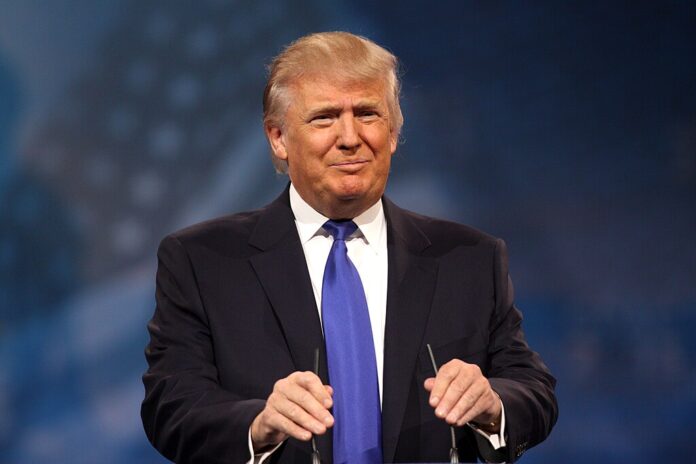In a controversial appearance, Donald Trump questioned whether Kamala Harris identifies as Black or Indian
In a contentious appearance before the National Association of Black Journalists (NABJ) in Chicago, former President Donald Trump sparked controversy by questioning Kamala Harris’s racial identity. During the event, Trump inaccurately claimed that Harris, the first Black woman and Asian American Vice President of the United States, had previously only promoted her Indian heritage.
Trump’s remarks came as he addressed the NABJ’s annual convention, where he expressed confusion about Harris’s racial identity, asking, “I didn’t know she was Black until a number of years ago when she happened to turn Black and now she wants to be known as Black. So, I don’t know, is she Indian or is she Black?”
Embed from Getty ImagesKamala Harris, who has a Jamaican father and an Indian mother, has publicly embraced both aspects of her heritage throughout her career. She attended Howard University, a prominent historically Black university, and was a member of the Alpha Kappa Alpha sorority. As a U.S. senator, she was an active member of the Congressional Black Caucus, advocating for legislation on voting rights and policing reform.
Trump’s remarks came amid heightened scrutiny of his comments on race and his ongoing campaign for the presidency. The former president has frequently targeted racial minorities and questioned the backgrounds of his opponents. His criticism of Harris follows a pattern of disparaging remarks about Black and minority figures, a tactic he employed during his presidency and continues to use in his current campaign.
Michael Tyler, communications director for Harris’s campaign, responded sharply to Trump’s comments. In a statement, Tyler denounced the former president’s remarks as a continuation of his history of hostility and divisiveness. “The hostility Donald Trump showed on stage today is the same hostility he has shown throughout his life, throughout his term in office, and throughout his campaign for president,” Tyler said. He further criticized Trump’s attempt to divide Americans rather than unite them.
White House Press Secretary Karine Jean-Pierre, who is Black, also condemned Trump’s remarks. During a press briefing, she expressed disbelief and described Trump’s comments as “insulting” and “repulsive.” Jean-Pierre emphasized that no one has the right to dictate someone else’s identity or how they choose to identify.
Trump’s appearance at the NABJ convention was marked by friction, particularly during an interview with ABC News’s Rachel Scott. Trump accused Scott of delivering a “very rude introduction” and criticized her for asking tough questions about his past criticisms of Black individuals and his associations with white supremacists. He also took issue with Scott’s network, ABC News, and its role in hosting presidential debates.
Throughout the event, Trump made additional controversial statements, including repeating his debunked claim that immigrants are “taking Black jobs.” When pressed for clarification on what constituted a “Black job,” Trump’s response that “a Black job is anybody that has a job” was met with discomfort from the audience.
The exchange has ignited discussions about Trump’s approach to race and his treatment of minority groups. As he campaigns for the presidency, his provocative comments and confrontational style continue to generate significant controversy and criticism.
Analysis:
Political: Trump’s questioning of Kamala Harris’s racial identity highlights the ongoing racial and political tensions in American politics. His remarks, viewed as an attempt to undermine Harris’s credibility and appeal, reflect broader strategies of polarization and divisiveness. By challenging Harris’s racial identity, Trump seeks to exploit cultural and racial divisions to his advantage. This incident underscores the intersection of race and politics, illustrating how political figures use identity issues to further their agendas.
Social: Socially, Trump’s comments have reignited discussions about race and identity in the U.S. His remarks touch on sensitive issues of racial authenticity and representation, which resonate with broader societal debates about how individuals navigate their identities in public life. The backlash from Harris’s campaign and White House officials reflects a broader societal rejection of attempts to invalidate or question personal identities based on racial or ethnic backgrounds.
Racial: The racial implications of Trump’s comments are significant. By questioning Harris’s racial identity, Trump not only challenges her personal narrative but also perpetuates a broader narrative of racial scepticism and division. His history of racially charged statements and actions contributes to a larger pattern of questioning the legitimacy of Black and minority figures in political and public spheres. This episode reinforces ongoing racial tensions and highlights the challenges faced by minority leaders in navigating a landscape marked by racial scrutiny.
Gender: Gender dynamics are also at play in this controversy. Trump’s remarks not only target Harris’s racial identity but also intersect with gender issues. As a prominent female leader of colour, Harris faces unique challenges in addressing both racial and gender-based criticisms. The hostility she encounters reflects broader societal attitudes toward women in leadership positions, particularly those from minority backgrounds. Trump’s use of gendered language and his history of derogatory remarks about women further compound the gendered aspect of this controversy.
Economic: Economically, the impact of Trump’s comments on Harris’s campaign could affect voter perceptions and support. The focus on identity politics may influence how different voter groups respond to the candidates. Trump’s remarks could either mobilize or alienate specific demographics, influencing campaign dynamics and electoral strategies. The economic implications of these interactions are tied to broader considerations of how identity politics shape voter behaviour and campaign funding.
